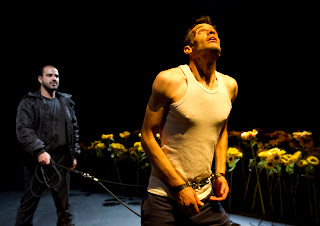'In the Penal Colony' review or 'Must you use such a scratchy pen?'
'In the Penal Colony', Franz Kafka
ShiberHur Theatre Company, Young Vic, 14th July 2011
Written for Culture Wars
 |
Amer Hlehel and Taher Najib as Executioner and Prisoner. Photo Credit: Richard H Smith |
Kafka's works are peppered with prisoners ensnared by a system they do not understand. In 'The Trial', protagonist Josef K is arrested for a crime he cannot recall and bamboozled by superiors he can never quite reach. In 'Metamorphosis', the imprisonment is made more suffocating still, with a man trapped inside an insect's body. And, in the short story 'In the Penal Colony', a prisoner is shackled to his executioner, who guards both the prisoner and the machine that will kill him. Yet victims always emerge in the strangest places in Kafka's tales and the executioner, enchanted by his death machine, turns out to be just as fettered as his feral hostage.
Amir Nizar Zuabi's production is in Arabic and the subtitles flash up on the front of the executioner's morbid machine. The machine, as its protector proudly explains to his visitor, is both judge and executioner. When the time is right, the prisoner is placed inside the contraption and his sentence is inscribed on his body over the course of 12 excruciating hours. But the Visitor's inspection suggests the machine is also approaching its final hours and, over the course of a short but painful play, the executioner fights for its survival.
Initially, Amer Hlehel's executioner plays the tour guide, carefully pointing out the machine's intricate functions to his reticent visitor (Makram Khoury). Both executioner and visitor come from the same 'homeland' and there is a taciturn connection between them, which creates an unsettling warmth given the brutal backdrop. But, as the visitor's purpose emerges and the executioner grasps the idea his machine will soon be shut down, a religious fervour engulfs him. He becomes possessed by the machine; its potential, its history and its beauty. He seems to radiate the very spiritual ardour he insists each of his prisoners has experienced. It's as if he's half way to hell or heaven already.
The fact the script is in Arabic places a particular pressure on the actors' rhythms and expressions. Hlehel is more musician than actor, spitting out some sections in fierce staccato and savouring other moments with a smoother and lazier delivery. He should be hideous but his loyal respect for the machine makes him hard to hate. Forget the fact this is a killing machine and he could be an art appreciator, an admirer of aesthetic splendour. At one point, the executioner reveals a panel to the visitor, inscribed with the prisoner's sentence. The panel is covered in elegant patterns, the crime all but hidden amidst the delicate flourishes. This is a man who has come to appreciate the intricacies of a machine so profoundly that he has all but forgotten those swirls spell out death.
Taher Najib's prisoner rarely seems frightened and, for the most part, plays the faithful dog panting for treats. It is only when he is finally lead towards the machine that the terror tears through him. He scampers around the black cloaked stage, running amongst a strangely symmetrical patch of sunflowers that scream out freedom. He is still clutching these flowers once inside the machine and, as we watch his punishment begin, he rubs against the flowers, clinging onto his last link to life.
It is the tone of Zuabi's production that is so mesmerising, as he squeezes us tight with fear and occasionally releases us with odd jolts of humour. Never once are we allowed to relax. Yet there is hope here too, as the prisoner constantly looks upwards towards the sun. As we sit in our own little black box, absorbing the spectacle from a safe distance, we yearn for outdoors again. It is one of few shows whose success lies in the deep desire it provokes for escape.




Comments
Post a Comment